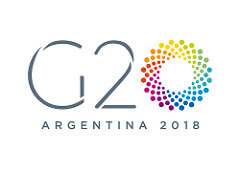Published on 4th September 2018
 The 2017 G20 declaration was clear on the profound changes happening on labour markets: “Acknowledging the increasing diversity of employment, we will assess its impact on social protection and working conditions and continue to monitor global trends, including the impact of new technologies, demographic transition, globalisation and changing working relationships on labour markets.”
The 2017 G20 declaration was clear on the profound changes happening on labour markets: “Acknowledging the increasing diversity of employment, we will assess its impact on social protection and working conditions and continue to monitor global trends, including the impact of new technologies, demographic transition, globalisation and changing working relationships on labour markets.”
Taking over the G20’s Presidency from Germany, Argentina made the future of work one of its priorities. The topic will be addressed on 3-7 September from the perspective of both education and employment. For the first time in G20 history, a joint Ministerial meeting will even be organised. According to the Argentinian Presidency, a stronger relationship between the two areas can result in more and improved access to work if policies to increase skill sets based on the demands of businesses themselves are deployed in different sectors.
The World Employment Confederation welcomes the more coordinated approach taken by Argentina for its G20 Presidency but warns that education alone will not be enough to deal with these changes. Labour market reform is needed for inclusive growth for workers and businesses. Regulation should acknowlege the need and existence of diverse forms of work and reform social protection systems to align them with the changing world of work. Increasing the possibilities of legally allowed contractual work arrangements will also help reduce informal work and promote decent work.
Taking advantage of the presence of international experts in Argentina, our Latin American federation will take a closer look at how these global trends will affect their region. A panel of experts from international organisations (ILO, G20), employers’ organisations (B20) and trade unions (L20) will debate the challenges and opportunities that the future of work creates for the region.
Follow @WECLatina and @WECglobal on Twitter for updates!